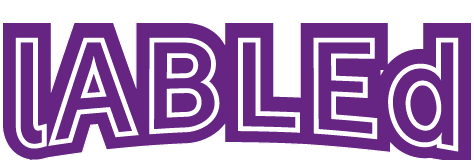Lucy Wood
When Alice and I started to plan this Disability and Technology Series for our spotlight season we were inundated with responses from people who wanted to tell us what affect tech has had on there lives or there work in the field of AI, accessibility and what it means for the future.
So much so that even the bonus content was slightly too full!
When I heard that Helen Hewson, Trustee of Communication Matters had agreed to come and join us for some bonus content, we were a both a little trepidatious. We sent Questions to Helen ahead of time so she could formulate the answers, programme them into the AAC and then, once Alice or I asked a question, she’d hit the button and a voice would read the answer out loud. A little editing and it sounds like a standard conversation.
Helen asked if we could ask a few questions at the end, that would remain unedited, so listeners could get an understanding of what its like for Helen to communicate day to day.
I went to school with people who used lots of different methods to communicate, signing, picturebooks, switches and AACs. You name it staff tried it, because they all had a belief that everyone has a voice that deserves to be heard.
Throughout our conversation with Helen, I found myself incredibly moved by her story and could empathize with her struggles to communicate, having seen it myself in others growing up.
I want to tell you about my best friend from School, Joe.

We met in sixth form and instantly hit it off, no-one has ever made me laugh as hard as him and he would chatter away next to me, narrating my day, gossiping or asking me to make a coffee. Just constant noise.
Joe had a muscle wasting condition, which meant that his disability got worse over time, his body just, very slowly gave up, you forget how hard that is to watch. Eventually they told us that Joe was finding the energy to speak increasingly difficult and would need a machine to help him.
After the AAC arrived and Joe typed into the machine, his words came out but his voice was replaced by a computer generated one. I realized then that I probably wouldn’t hear his voice again. I felt like a bit of my friend was being taken away. A lump formed in my throat, tears formed in my eyes I felt flush with embarrassment, trying to hide my face from Joe as I fought back tears.
Joe knew I was struggling, he grabbed my hand squoze it tight and as I caught his eye he flashed a smile and a wink. He continued to do it every morning until I left School.
Joe passed away not long after, and looking back now I am thankful for the technology that still allowed me to communicate with my best friend. His voice may have gone, but he was still there.
I am so proud of the diversity of guests we accept on the podcast, as we sat chatting to Helen, I knew that Helen’s voice, and her story deserved to be heard and Alice and I agreed it should feature on the main feed for our wider audience.
I’m proud of that. There are not many podcast that would let someone like Helen on, logistics are often tricky, and some can’t stand dead air, but Helen taught both Alice and I that communication is just as much about listening as it is about talking. Just because communication might seem difficult doesn’t mean that an AAC users voice isn’t important,
